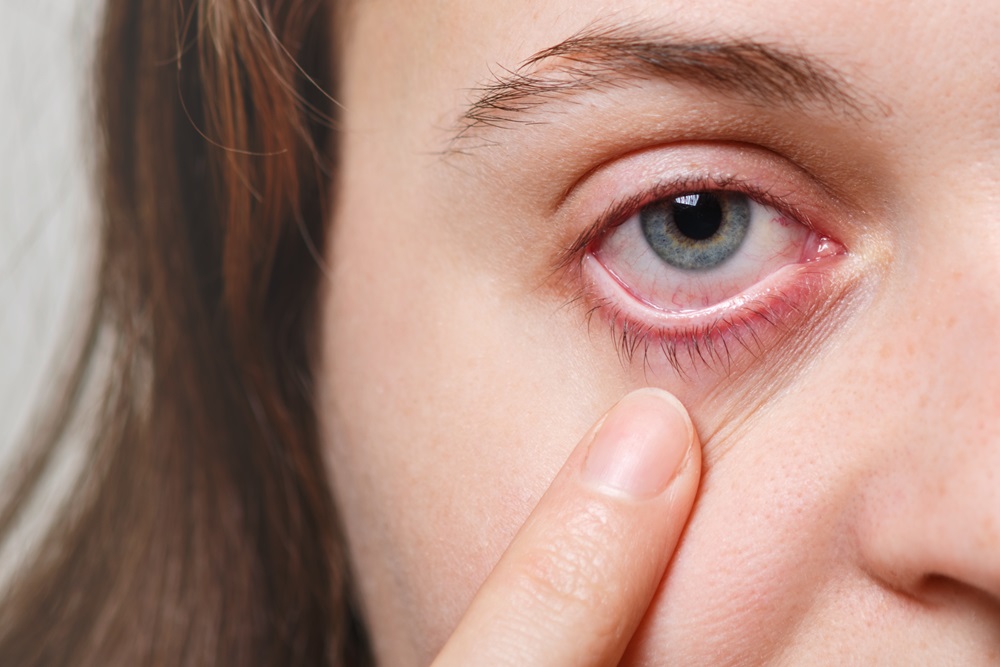It is a condition that occurs with symptoms such as itching, watering, redness in the eye due to various allergens.
Allergic Conjunctivitis: Symptoms, Causes, and Treatment Options
Allergic conjunctivitis is an inflammation of the conjunctiva (the thin membrane covering the white part of the eye) caused by an allergic reaction to substances like pollen, dust, or pet dander. It is a common condition that can cause significant discomfort but is usually not vision-threatening. Here’s a detailed guide to understanding and managing allergic conjunctivitis:
What Is Allergic Conjunctivitis?
Allergic conjunctivitis occurs when the conjunctiva reacts to allergens, leading to inflammation and irritation. It can be seasonal (caused by pollen) or perennial (caused by year-round allergens like dust mites or pet dander). Common types include:
Seasonal Allergic Conjunctivitis (SAC): Triggered by pollen during specific seasons.
Perennial Allergic Conjunctivitis (PAC): Caused by indoor allergens like dust mites or mold.
Vernal Keratoconjunctivitis (VKC): A more severe form, often seen in children and young adults.
Atopic Keratoconjunctivitis (AKC): Associated with atopic dermatitis and chronic eye inflammation.
Giant Papillary Conjunctivitis (GPC): Often linked to contact lens use or eye prostheses.
Symptoms of Allergic Conjunctivitis
Itchy eyes: The most common and prominent symptom.
Redness: Due to inflammation of the blood vessels in the conjunctiva.
Watery eyes: Excessive tearing as a response to irritation.
Swollen eyelids: Especially noticeable in the morning.
Burning or stinging sensation: A feeling of discomfort in the eyes.
Sensitivity to light (photophobia): Eyes may become more sensitive to bright light.
Stringy discharge: A clear or white discharge may be present.
Causes of Allergic Conjunctivitis
Pollen: From trees, grasses, and weeds.
Dust mites: Tiny organisms found in household dust.
Pet dander: Skin flakes from cats, dogs, or other animals.
Mold spores: Found in damp environments.
Contact lens solutions or materials: Can trigger GPC.
Diagnosis of Allergic Conjunctivitis
Physical examination: The doctor will inspect the eyes for redness, swelling, and discharge.
Allergy testing: Skin prick tests or blood tests to identify specific allergens.
Slit-lamp examination: To evaluate the conjunctiva and rule out other eye conditions.
Treatment Options for Allergic Conjunctivitis
Avoidance of Allergens:
Stay indoors during high pollen seasons.
Use air purifiers and wash bedding frequently to reduce dust mites.
Avoid contact with pets if allergic to animal dander.
Medications:
Antihistamine eye drops: To relieve itching and redness (e.g., olopatadine, ketotifen).
Mast cell stabilizers: To prevent the release of histamine (e.g., cromolyn sodium).
Steroid eye drops: For severe inflammation (short-term use only).
Artificial tears: To lubricate the eyes and wash away allergens.
Oral Antihistamines:
For systemic relief of allergy symptoms (e.g., cetirizine, loratadine).
Immunotherapy (Allergy Shots):
Long-term treatment to desensitize the immune system to specific allergens.
Cold Compresses:
To reduce swelling and soothe irritated eyes.
Recommendations for Patients
Avoid rubbing your eyes, as this can worsen symptoms.
Wash your hands frequently to reduce the transfer of allergens to your eyes.
Follow your doctor’s treatment plan and attend regular check-ups.
Allergic Conjunctivitis Treatment in Turkey
Why Choose Turkey for Allergic Conjunctivitis Treatment?
Expert Ophthalmologists: Turkey has highly skilled specialists in ocular allergies and eye care.
Advanced Technology: Hospitals are equipped with state-of-the-art diagnostic and treatment tools.
Affordable Costs: Treatment costs in Turkey are significantly lower than in many Western countries.
Comprehensive Care: From diagnosis to post-treatment follow-up, Turkish healthcare providers offer holistic care.
Treatment Options Available in Turkey
Medications: Antihistamine eye drops, mast cell stabilizers, and steroid drops.
Allergy Testing: Skin prick tests and blood tests to identify specific allergens.
Immunotherapy: Allergy shots or sublingual immunotherapy for long-term relief.
Lifestyle and Environmental Modifications: Guidance on reducing exposure to allergens.
Recommendations for International Patients
Research and choose a reputable hospital or clinic with experience in treating allergic conjunctivitis.
Consult with a specialist to determine the best treatment plan for your condition.
Plan for a stay of at least 1-2 weeks for treatment and follow-up appointments.
Check if your insurance covers international treatments or inquire about hospital payment plans.
Conclusion
Allergic conjunctivitis is a common and manageable condition. With proper avoidance of allergens, medications, and advanced treatments, symptoms can be effectively controlled. Turkey offers high-quality and affordable care for allergic conjunctivitis, making it an excellent choice for international patients. Early diagnosis and consistent treatment can help maintain eye health and improve quality of life.
If you have further questions or need assistance, feel free to reach out to a healthcare professional or a trusted medical tourism agency in Turkey.
